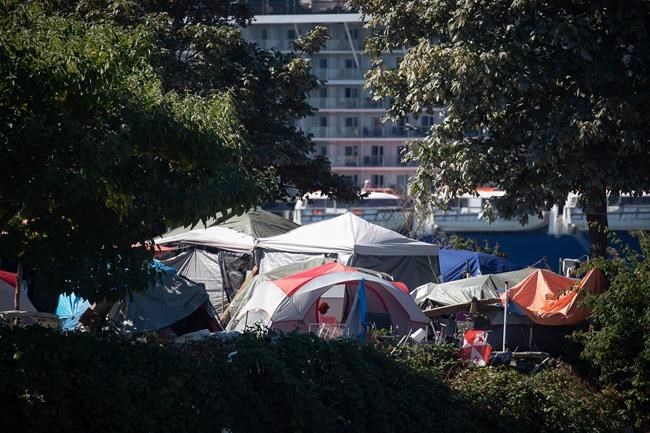VANCOUVER — Residents in Vancouver's only legal tent encampment are wary of a city plan to force them to temporarily move while it cleans up the site, an advocate said.
Fiona York said there's a fear among the dozens of residents of Crab Park in the Downtown Eastside that what the city says is only a one-week displacement could turn into a complete eviction.
"Time and time again, we see in other cities, and here in Vancouver, that … (there have been) so many other tent cities evictions in the last five years," she said.
Vancouver's deputy city manager Sandra Singh said the proposed plan is to shut down the section of Crab Park designated for the tent city for a week starting March 25 so equipment can be brought in to clean piles of debris and unsafe structures.
Vancouver Park Board general manager Steve Jackson said staff assessed the site in January and realized the area couldn't be cleaned by hand. He said the dangers include debris, propane tanks, needles, feces and a rat infestation.
But York said residents frequently clean their area and don't want to live in an unsanitary environment. She said they've suggested the encampment be cleaned in sections, rather than all at once, or that the city provide residents with resources to clean it themselves.
"(I'm) frustrated about the lack of communication, given all of the feedback and all of the reasonable responses that have been provided by residents and myself," she said.
York said discussions around leaving should await a decision over a human rights complaint that alleges the tent city is not being provided with basic needs such as washrooms and electricity.
Singh said the amount of debris makes it unsafe for residents to clean it themselves and too difficult to do in phases. She said she considers the human rights complaint a separate process from the cleanup plans.
She said on Tuesday that the proposed plan has been posted for residents to see and that staff from the park board will be at Crab Park for the rest of the week to collect feedback and make adjustments if needed.
Effective March 18, residents will have a week to move to a different undisclosed location elsewhere in the park, before fences go up and cleaning starts.
"We know this is going to be stressful. There's no way to do this work that isn't stressful for people," Singh said,
"We recognize that one of the things that we can do to help with that is to provide certainty as soon as (is) feasible."
Singh said the city's actions are not a decampment, since the estimated 30 to 50 people staying at the site will be allowed to return.
Rules that will need to be followed after the cleanup include having only a single tent in a three-metre-by-three-metre space, and not having materials such as generators, propane tanks and building materials.
Singh says if the people staying at the Crab Park site don't comply, they'll have to reconsider allowing the encampment to remain.
The encampment began in 2021 and remained in place a year later when a B.C. Supreme Court judge set aside eviction notices, in part, because the city didn't have enough indoor shelter spaces to accommodate those living in tents.
York said some people spent months shoring up their tents with extra tarps or insulation for the winter and that the structures on the site help build community, which brings its own type of safety.
"So, to take away things that create safety, in the name of safety, it doesn't make sense," she said.
The advocacy group Stop the Sweeps Vancouver posted a statement online last week, saying the park board was citing significant health and fire concerns, but there are no orders from Vancouver Coastal Health or Vancouver Fire.
"This is a forced removal of people from their homes that will result in the destruction of those homes & people's lives made less safe."
This report by The Canadian Press was first published March 12, 2024.
Ashley Joannou, The Canadian Press




